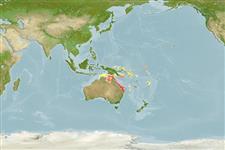>
Gobiiformes (Gobies) >
Gobiidae (Gobies) > Gobiinae
Etymology: Amblyeleotris: Greek, amblys = darkness + The name of a Nile fish, eleotris (Ref. 45335); callopareia: Specific epithet from a Greek word meaning beautiful-cheeked, referring to the distinctive coloration on the side of the head..
Environment: milieu / climate zone / depth range / distribution range
Écologie
marin démersal; profondeur 50 - 100 m (Ref. 26237). Tropical
Western Pacific: known only from the Great Barrier Reef , Australia.
Taille / Poids / Âge
Maturity: Lm ? range ? - ? cm
Max length : 7.8 cm SL mâle / non sexé; (Ref. 26237)
Description synthétique
Morphologie | Morphométrie
Épines dorsales (Total): 7; Rayons mous dorsaux (Total): 12; Épines anales 1; Rayons mous anaux: 12 - 13.
Collected from sandy reef slope at a depth of 26 m. Associated with burrowing alpheid prawns (Ref. 26237).
Life cycle and mating behavior
Maturité | Reproduction | Frai | Œufs | Fécondité | Larves
Polunin, N.V.C. and R. Lubbock, 1979. Five new prawn-associated gobies (Teleostei: Gobiidae) of the genus Amblyeleotris. Bull. Br. Mus. Nat. Hist. (Zool.) 36(4):239-249. (Ref. 26237)
Statut dans la liste rouge de l'IUCN (Ref. 130435)
Menace pour l'homme
Harmless
Utilisations par l'homme
Plus d'informations
PaysZones FAOÉcosystèmesOccurrencesIntroductionsStocksÉcologieRégime alimentaireÉléments du régime alimentaireConsommation alimentaireRation
Noms communsSynonymesMétabolismePrédateursÉcotoxicologieReproductionMaturitéFraiRassemblement de ponteFéconditéŒufsDéveloppement de l'œuf
Taille/ÂgeCroissanceLongueur-poidsLongueur-longueurFréquences de longueursMorphométrieMorphologieLarvesDynamique des populations larvairesRecrutementAbondanceBRUVS
RéférencesAquacultureProfil d'aquacultureSouchesGénétiqueElectrophoresesHéritabilitéPathologiesTraitementNutrientsMass conversion
CollaborateursImagesStamps, Coins Misc.SonsCiguateraVitesseType de nageSurface branchialeOtolithesCerveauxVision
Outils
Articles particuliers
Télécharger en XML
Sources Internet
Estimates based on models
Preferred temperature (Ref.
123201): 21.7 - 26.9, mean 24.9 °C (based on 5 cells).
Phylogenetic diversity index (Ref.
82804): PD
50 = 0.5000 [Uniqueness, from 0.5 = low to 2.0 = high].
Bayesian length-weight: a=0.00912 (0.00295 - 0.02818), b=2.98 (2.72 - 3.24), in cm total length, based on LWR estimates for this (Sub)family-body shape (Ref.
93245).
Niveau trophique (Ref.
69278): 3.3 ±0.4 se; based on size and trophs of closest relatives
Résilience (Ref.
120179): Haut, temps minimum de doublement de population inférieur à 15 mois (Preliminary K or Fecundity.).
Fishing Vulnerability (Ref.
59153): Low vulnerability (10 of 100).
